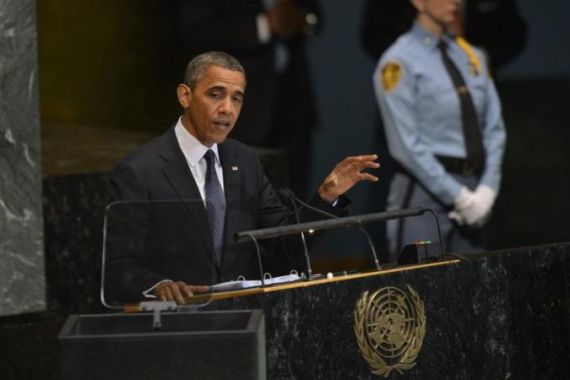Obama must fight back against blowback and bluster
Obama changed the tone and rhetoric of the “war on terror”, yet escalated drone attacks, going after high value targets.

Even as Mitt Romney and Paul Ryan continue to blast President Obama and Secretary Clinton’s foreign policy successes, al-Qaeda leader Zawahiri issued another statement urging Muslims to protest the anti-Islamic film and to “continue their opposition to American crusader Zionist aggression against Islam and Muslims”, according to Reuters.
On the eve of the second presidential debate, as Secretary Clinton took responsibility for the security in Benghazi attacks, she said, “I want to avoid some kind of political gotcha”. Surely, this is an issue that is bound to come up.
Benghazi blowback
Apparently, there was no direct linkage between the cheaply made film and the attacks on the US Consulate in Benghazi. Last week, US Congress started an investigation on the attacks in Benghazi, attempting to uncover the lapses in security which led to the death of four state department officials, including Ambassador Stevens.
As Pepe Escobar reported in Asia Times shortly after the attacks, “In September 2012, for the first time in three months, al-Qaeda leader Ayman al-Zawahiri, aka The Surgeon, released a 42-minute video special to ‘celebrate’ the 11th anniversary of 9/11, finally admitting the snuffing out of his number two. His number two was none other than Abu Yahya al-Libi – targeted by one of US President Barack Obama’s cherished drones in Waziristan on June 4.”
We may have a clear motive for the attack on the 11th anniversary of 9/11. According to AFP, “Zawahiri does single out US President Barack Obama for being a ‘liar’ who was elected to ‘trick’ Muslims around the world, but who nevertheless is ‘being defeated in Afghanistan’.”
Neocon bluster
In other words, contrary to what neocon advisers around Mitt Romney would have us believe, the anti-American protests across the Middle East and North Africa are partly a reflection of the effectiveness of Obama administration’s counter-terrorism strategy, a senior political scientist at RAND Corporation told me.
Obama’s record speaks for itself, but during Tuesday night’s presidential debate he must defend it:
- Elimination of Osama bin Laden
- National Strategy for Counter-terrorism with a target on al-Qaeda network
- Ended War in Iraq and removed troops by end of 2011
- Implemented a new strategy for Pakistan and Afghanistan with re-focus on al-Qaeda
- Built an international coalition to stop a massacre in Libya and to support the overthrow the regime of Muammar Gaddafi
- Promoting democratic reform, economic development, and peace and security across the Middle East and North Africa
- Proposed a new beginning between the United States and Muslims world
To Bush, or not to Bush?
President Obama changed the tone and rhetoric of the “war on terror”, yet he escalated the drone attacks, going after high value targets. After eight years of Bush-Musharraf alliance (jokingly known as the Busharraf years), Obama executed a leaner and meaner strategy.
As an anti-war candidate yet a wartime president, Obama has been caught in a Shakespearian dilemma: to Bush, or not to Bush, that is the question. He was decidedly anti-Bush in his rhetoric and policy. Ironically, his approval in Pakistan has reached the same abysmally low range, according to the latest non-partisan Pew Research data.
At Asia Society two weeks ago, the Pakistani foreign minister Hina Rabanni Khar told Tom Nagorski, the incoming VP, “This has to be our war … We are the ones who have to fight against them. As a drone flies over the territory of Pakistan, it becomes an American war again. And this whole logic of this being our fight, in our own interest is immediately put aside and again it is war which is imposed on us.”
Obama has been “leading from the front” in Pakistan. He can hardly be accused of passivity. On the other hand, “leading from behind” has been instrumental in toppling dictatorships in North Africa – Mubarak, Ben-Ali, Gaddafi, and now Assad – but it has left a power vacuum that has resulted in a blowback and anti-American protests at consulates and embassies. Additional aid spending may be able to contain it.
Romney-Ryan rhetoric
Instead, what we have been hearing from Romney and Ryan is the blustering claim that “President Obama’s foreign policy is unravelling”, which according to Thomas Friedman plainly does not match the evidence. Romney is trying to fit into Bush’s old cowboy boots, while painting Obama to be the anti-Bush. It is like deploying an often used cultural meme: “Democrats are wimps. Republicans are tough. Obama’s been a wimp. I will be tougher… It’s a real stretch.”
Mitt Romney’s foreign policy speech delivered last week has received mixed reviews from all sides. Conservatives thinkers like Danielle Pletka at the American Enterprise Institute (AEI) have suggested that Romney moved beyond the “no apology” tour, but hardly advanced a new vision for Israel-Palestinian peace, nuclear deal with Iran and a collaborative relationship with China.
Republican senator Rand Paul, who tends to be libertarian, was dismayed by Romney’s comments. “Romney chose to criticise President Obama for seeking to cut a bloated Defence Department and for not being bellicose enough in the Middle East, two assertions with which I cannot agree,” Paul suggested.
However, according to Pew Research, Obama’s image on the Muslim street after four years may have already been correlated with some of the excesses of US foreign policy. Thus, during the second town-hall debate with Mitt Romney, President Obama must fight back against the bluster at home, while trying to explain away the blowback abroad.
Dinesh Sharma is the author of Barack Obama in Hawaii and Indonesia: The Making of a Global President, which was rated as the Top 10 Black history books for 2012. His next book on President Obama, Crossroads of Leadership: Globalization and American Exceptionalism in the Obama Presidency, is due to be published with Routledge Press.
